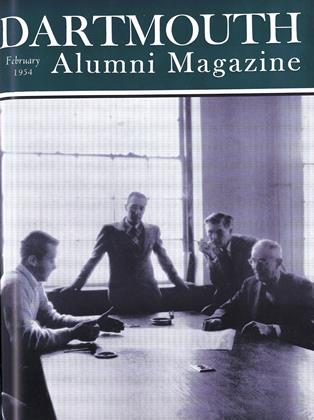ALONG with The New York Times, Thomas Jefferson is one of my sacred cows, so I was doubly happy this Christmas to get three volumes about him.
One was by John Dos Passos: The Headand Heart of Thomas Jefferson (Doubleday), which took Jefferson up to his Cabinet position in the Washington government. Here I read the best account I had seen of Jefferson's education under the tutelage of Governor Fauquier, George Wythe, the lawyer, and especially Dr. William Small of Scotland, professor of mathematics, learned in all fields, a man of good manners, and altogether a worthy mentor for a worthy young man. Jefferson wrote of Small: "It was my great good fortune, and what probably fixed the destinies ofmy life, that Doctor William Small ... became soon attached to me, and made me his daily companion when not engaged in the school; and from his conversation I got my first views of the expansion of science, and of the system of things in which we are placed." This kind of thing is about the only reward a teacher gets in this life, and I hope Small considered it ample.
There are excellent chapters on Jefferson's stewardship as governor of Virginia, one of the most controversial periods in his life (Dos Passos is most rational about this epoch); and of his long love affair with his wife which terminated only with her death, a blow from which he never entirely recovered.
The other two volumes, by Dumas Malone, I have only started, but as far as I have gone I have found them eminently satisfactory. The first, Jefferson the Virginian, carries his life up to 1784; the second, Jefferson and the Rights of Man, up to his Presidency. So Dos Passos and Malone cover about the same period of time; Malone goes into much greater detail; Dos Passos is more general. Together the two authors complement each other, and I expect to enjoy several weeks of fine reading in the Malone, my appetite for more about Jefferson having been whetted by Dos Passos.
If my reader enjoys American history he will enjoy General Thomas James' ThreeYears Among the Indians and the Mexicans, first published in 1846. James pioneered on two separate frontiers (lately popularized by Guthrie's novel The BigSky, and the excellent books by Bernard de Voto), one, as a member of the St. Louis Missouri Fur Company's expedition of 1809-1810 to the headwaters of the Missouri (the company treated him shabbily), and, two, as a trader to Santa Fe and to the Comanche Indians in the years 1821-1823, when he was again one of the first Americans to traverse and describe the southwestern area extending from St. Louis to Santa Fe. His recital of many thrilling adventures is detailed, and often vivid. Highly recommended.
Some of us at the Baker Library think enough of the writings of Walter de la Mare to get together a collection of his first and limited editions: ably assisted, I might add, by Hank Embree '30 of Chicago. It has assumed astonishing proportions, for de la Mare has had a long life, and has written many volumes, all of which are of a very high quality.
One that came my way at Christmas especially delighted me as the book, PrivateView (Faber, 1953), is composed of his many reviews and articles for the LondonTimes Literary Supplement, certainly one of the finest, if not the finest, weekly book review in the world. His subjects range from Tchekov's letters, Hardy's Dynasts (a magnificent and lasting contribution to English literature) and "maps in fact and fiction" to observations on rustic speech, the strange character Fiona Macleod, and the reminiscences of John D. Rockefeller.
His poetic vision has not dimmed, for his newest book of poems now before me, O Lovely England (1953), is as sharp and clear as his early work. You could do worse than to read again, or for the first time, almost any volume by de la Mare.
from the present senior class between April is and 16.
Alumni may also apply for any of the Dartmouth Graduate Fellowships listed in the Dartmouth College Bulletin Honors& Degrees, August, 1953, pp. 7-9. The closing date for these applications will probably be April 34, 1954. Information and forms may be obtained from Professor Diller.
 View Full Issue
View Full Issue
More From This Issue
-
 Feature
FeatureDartmouth's Faculty Policies
February 1954 By DONALD H. MORRISON '47h -
 Feature
FeatureTestament of a Teacher
February 1954 By ROYAL CASE NEMIAH '23h -
 Feature
FeatureThe Teacher of Social Science and the World Crisis
February 1954 By JOHN CLINTON ADAMS -
 Feature
FeatureMy "Most Unforgettable Character"
February 1954 By JAMES L. MONTAGUE '28 -
 Class Notes
Class Notes1918
February 1954 By ERNEST H. EARLY, W. CURTIS GLOVER, RICHARD P. WHITE -
 Class Notes
Class Notes1932
February 1954 By JOHN A. WRIGHT, JOHN B. WOLFF JR.
HERBERT F. WEST '22
-
 Article
ArticleHanover Browsing
February 1938 By HERBERT F. WEST '22 -
 Article
ArticleHanover Browsing
December 1939 By HERBERT F. WEST '22 -
 Books
BooksHUDSON BAY EXPRESS,
January 1943 By Herbert F. West '22 -
 Books
BooksDEVIL BY THE TAIL
May 1947 By Herbert F. West '22 -
 Article
ArticleHanover Browsing
October 1952 By HERBERT F. WEST '22 -
 Article
ArticleHanover Browsing
June 1953 By HERBERT F. WEST '22
Article
-
 Article
ArticleFaculty Chairmen
June 1947 -
 Article
Article114 Sons of Dartmouth Men in New Freshman Glass
November 1950 -
 Article
ArticleMore Married Men, More Children
June 1955 -
 Article
ArticleSwimming
February 1960 By CLIFF JORDAN '45 -
 Article
ArticleBallad of Elm Fever
June 1938 By DAVID J. BRADLEY '38 -
 Article
ArticleHanover Browsing
November 1951 By HERBERT F. WEST '22



